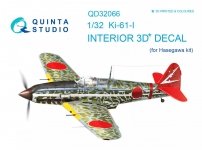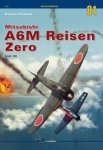-
Załączniki bezpieczeństwa
Załczniki do produktuZałączniki dotyczące bezpieczeństwa produktu zawierają informacje o opakowaniu produktu i mogą dostarczać kluczowych informacji dotyczących bezpieczeństwa konkretnego produktu
-
Informacje o producencie
Informacje o producencieInformacje dotyczące produktu obejmują adres i powiązane dane producenta produktu.KAGERO
-
Osoba odpowiedzialna w UE
Osoba odpowiedzialna w UEPodmiot gospodarczy z siedzibą w UE zapewniający zgodność produktu z wymaganymi przepisami.
Kagero 12021 Japanese Fighters in Defense of the Homeland, 1941-1944. Vol. I EN
Japanese Fighters in Defense of the Homeland, 1941–1944. Vol. I
Leszek A. Wieliczko
Przystępując do wojny z mocarstwami zachodnimi w grudniu 1941 roku Japonia dysponowała na swoim terytorium tylko niewielkimi siłami lotniczymi przeznaczonymi do obrony powietrznej kraju. Szok, jakim dla japońskiego dowództwa był rajd Doolittle’a z 18 kwietnia 1942 roku, spowodował zmiany organizacyjne w systemie obrony powietrznej i przyspieszył proces przezbrajania jednostek w nowe typy myśliwców. Znacznie poważniejsze zagrożenie pojawiło się w połowie czerwca 1944 roku, wraz z pierwszym nalotem bombowców B-29 na macierzyste terytorium Wysp Japońskich. Od tej chwili głównym zadaniem Naczelnego Dowództwa Obrony (Boei Soshirebu) stała się obrona przed dewastującymi japońskie miasta nalotami amerykańskich bombowców.
W tomie I opisano proces kształtowania się systemu obrony powietrznej Japonii od chwili utworzenia Naczelnego Dowództwa Obrony w lipcu 1941 roku, poprzez zmiany organizacyjne w kolejnych latach, przygotowania do odparcia amerykańskich nalotów, aż do walk powietrznych toczonych w obronie kraju od czerwca do grudnia 1944 roku. Zaprezentowano także główne typy japońskich myśliwców wykorzystywanych w jednostkach obrony powietrznej.
80 stron
73 zdjęcia
12 profili barwnych (16 rzutów)
Japanese Fighters in Defense of the Homeland, 1941–1944. Vol. I
Leszek A. Wieliczko
When the Empire of Japan started the war against Western powers in 1941, it had only a small number of air force units deployed on the Japanese home islands in order to defend them. The Doolittle Raid on 18 April 1942 came as such a shock for the Japanese High Command that it caused structural changes within the Japanese air defence system and speeded up the introduction of new types of fighters. Much bigger threat for Japan emerged in the mid of June 1944 when the first air raid of B-29 bombers reached the Japanese home islands. Since that moment protecting Japanese cities from the devastating blows carried out by the U.S. bombers became the General Defence Command (Boei Soshirebu) main task.
Volume I describes the forming process of the Japanese air defence system since the creation of the General Defence Command in July 1941, throughout the structural changes within the following years, preparations to counter the U.S. bomb raids until the air battles fought between June and December 1944 in the defence of Japan. This part of the book also includes descriptions of all major types of Japanese fighters which were deployed in air defence units.
80 pages
73 photos
12 color profiles (16 throws)
Text in English















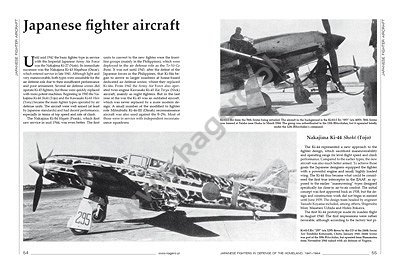
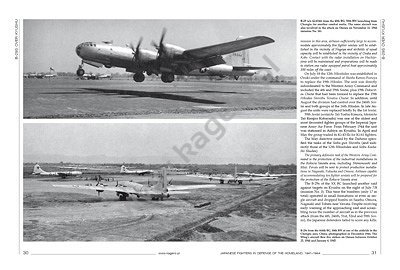
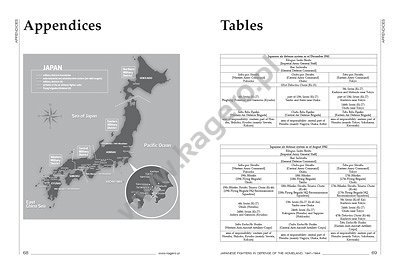
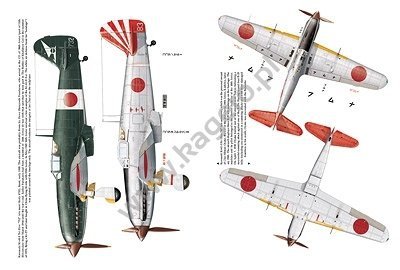

 1 szt.
1 szt.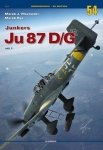
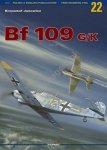
 2 szt.
2 szt.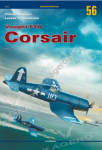

 36 szt.
36 szt.



